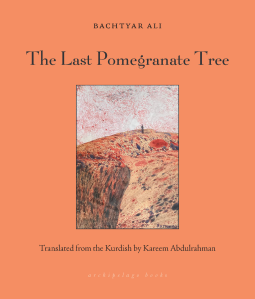
The Last Pomegranate Tree
by Bachtyar Ali
This title was previously available on NetGalley and is now archived.
Send NetGalley books directly to your Kindle or Kindle app
1
To read on a Kindle or Kindle app, please add kindle@netgalley.com as an approved email address to receive files in your Amazon account. Click here for step-by-step instructions.
2
Also find your Kindle email address within your Amazon account, and enter it here.
Pub Date Jan 24 2023 | Archive Date Nov 27 2022
Talking about this book? Use #TheLastPomegranateTree #NetGalley. More hashtag tips!
Description
“Whenever he told lies, the birds would fly away. It had been that way since he was a child. Whenever he told a lie, something strange would happen.”
So begins Bachtyar Ali’s The Last Pomegranate, a phantasmagoric warren of fact, fabrication, and mystical allegory, set in the aftermath of Saddam Hussein’s rule and Iraq’s Kurdish conflict.
Muzafar-i Subhdam, a peshmerga fighter, has spent the last twenty-one years imprisoned in a desert yearning for his son, Saryas, who was only a few days old when Muzafar was captured. Upon his release, Muzafar begins a frantic search, only to learn that Saryas was one of three identical boys who became enmeshed in each other’s lives as war mutilated the region.
An inlet to the recesses of a terrifying historical moment, and a philosophical journey of formidable depths, The Last Pomegranate interrogates the origins and reverberations of atrocity. It also probes, with a graceful intelligence, unforgettable acts of mercy.
Advance Praise
“Superbly realized novel of life, death, and what lies between . . . Blending magical realism with dark fables worthy of Kafka, Kurdish novelist Ali spins episodes that require the willing suspension of disbelief while richly rewarding that surrender . . . Altogether extraordinary: a masterwork of modern Middle Eastern literature deserving the widest possible audience.”
--Kirkus Reviews, starred review
“Kaleidoscopic and mesmerizing . . . Ali’s novel is a visionary wonder that plunges into the dreamscape of a people’s fraught memory. For readers, this is unforgettable.”
--Publishers Weekly, starred review
“Bachtyar Ali’s skillful, seamless movement between history and mythologies is unique in its political engagement and cultural depths. A major writer of our time.”
--Rawi Hage, author of Stray Dogs
Available Editions
| EDITION | Other Format |
| ISBN | 9781953861405 |
| PRICE | $24.00 (USD) |
| PAGES | 400 |
Average rating from 7 members
Featured Reviews
 Laurie S, Reviewer
Laurie S, Reviewer
I received this eARC from NetGalley and the publisher in return for an honest review.
The Last Pomegranate Tree is a Kurdish novel set in the Kurdistan region of Iraq. The backdrop is that of wars: uprisings, revolutions, and civil wars set during the presidency of Saddam Hussein. I don’t know enough about the history of Iraq to be able to say precisely when the story happens and the years of various events mentioned. The 1991 uprisings against Saddam Hussein after the Gulf War are frequently referenced. The narrator is Muzafar-i Subhdam, a father and Kurdish fighter who was imprisoned just days after the birth of his son. Twenty-one years later he is mysteriously released and he begins his search for his long lost son, Saryas Subhdam.
Muzafar-i tells this story some time after his release, and it involves flashbacks and jumping around in time as tales of assorted characters are told: Muhammad the Glass-Hearted, who loves discovering secrets; the sisters in white, who pledge to never marry; the “poorest blind boy in the world,” Nadim-i Shazada, who searched for the last pomegranate tree; and the three Saryas Subhdams. (Yes, three Saryas boys who are of the same age. It is explained eventually, but the resolution of that mystery isn’t really the point.)
Violence, war and corruption are endemic to this world, and so are magical convictions: the beliefs of the sisters in white, the beliefs of the glass hearted man, the beliefs of Salah the Great, the beliefs of the narrator.
Despite the constant realities of war and corruption, there are elements of the story that feel fantastical and made me question how reliable the narrator was, and if maybe Muzafar-i was dreaming. Geographical locations, the desert where Muzafar-i was imprisoned and at the other end of the country, the mountainous region where the pomegranate tree is located, play mythical roles that contribute to the mixing of fantasy and reality.
This is an engrossing read which glides with many images and sensory experiences where you are constantly trying to find your footing in the Kurdistan world, which is already an unknown world to most American readers. I really enjoyed this tale interspersed with voices of varied people struggling to make sense of a war torn reality. Brutal realities are turned into fabled metaphors. At its core, this is a story of hope and humanity, human resilience and longing for connection and meaning.
Some interesting tidbits: the author is Kurdish–raised and educated in Kurdistan. He has lived in Germany for a number of years and is a prolific, award-winning writer. The translator previously translated one of the author’s other books–the first book translated from Kurdish to English.
 Aravind M, Reviewer
Aravind M, Reviewer
The last pomegranate tree dwells into lines between magical realism and reality through a thin line. An established journey of searching with a good philosophical tone. Understanding war and time in a different perspective where most would write about the agony, the writer decides to write about the aftermath of everything. And what each thinks as freedom. I was really thankful to have read the english version of the book.
I just reviewed The Last Pomegranate Tree by Ali Bachtyar. #TheLastPomegranateTree #NetGalley
 Greg Y, Reviewer
Greg Y, Reviewer
This is a very affecting tale set against the backdrop of the 1991 Kurdish uprising in Iraq.
Muhammad the Glass-Hearted is the son of one of the rebel leaders. He meets an untimely death when his heart shatters from his unrequited love for one of the enigmatic white sisters. When visiting his grave, the sisters encounter Muhammad's great friend, the street vendor Saryas-i-Subhdam. Saryas, and they swear to treat him as their brother for eternity.
Before Muhammad's death, he and Saryas visit the last pomegranate tree, with a blind young man. Together they make solemn promises of brotherhood, and bury them at the tree.
The story is told by Muzafar-i-Subhdam, who has just been released from decades of solitary confinement in the desert. Muzafar is searching for his son Saryas, whom he has never met. Just when Muzafar thinks he is on the right trail, it turns out that there is another Saryas, of the same age as the street vendor.
This is a beautiful piece of magic realism. It tells of the horrors of war, but at the same time portrays the different kinds of love that we can have for one another. Most of all, it gives a message that love for our kin is not enough, and that all children need out love.





